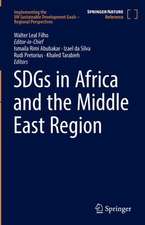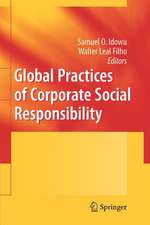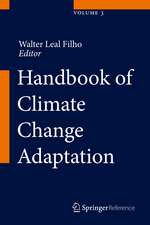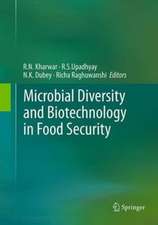African Handbook of Climate Change Adaptation
Editat de Walter Leal Filho, Nicholas Oguge, Desalegn Ayal, Lydia Adeleke, Izael da Silvaen Limba Engleză Mixed media product – 6 iul 2021
Climate
change
is
a
major
global
challenge.
However,
some
geographical
regions
are
more
severly
affected
than
others.
One
of
these
regions
is
the
African
continent.
Due
to
a
combination
of
unfavourable
socio-economic
and
meteorological
conditions,
African
countries
are
particularly
vulnerable
to
climate
change
and
its
impacts.
The recently released IPCC special report "Global Warming of 1.5º C" outlines the fact that keeping global warming by the level of 1.5º C is possible, but also suggested that an increase by 2º C could lead to crises with crops (agriculture fed by rain could drop by 50% in some African countries by 2020) and livestock production, could damage water supplies and pose an additonal threat to coastal areas. The 5th Assessment Report produced by IPCC predicts that wheat may disappear from Africa by 2080, and that maize— a staple—will fall significantly in southern Africa. Also, arid and semi-arid lands are likely to increase by up to 8%, with severe ramifications for livelihoods, poverty eradication and meeting the SDGs. Pursuing appropriate adaptation strategies is thus vital, in order to address the current and future challenges posed by a changing climate.
It is against this background that the "African Handbook of Climate Change Adaptation" is being published. It contains papers prepared by scholars, representatives from social movements, practitioners and members of governmental agencies, undertaking research and/or executing climate change projects in Africa, and working with communities across the African continent. Encompassing over 100 contribtions from across Africa, it is the most comprehensive publication on climate change adaptation in Africa ever produced.
The recently released IPCC special report "Global Warming of 1.5º C" outlines the fact that keeping global warming by the level of 1.5º C is possible, but also suggested that an increase by 2º C could lead to crises with crops (agriculture fed by rain could drop by 50% in some African countries by 2020) and livestock production, could damage water supplies and pose an additonal threat to coastal areas. The 5th Assessment Report produced by IPCC predicts that wheat may disappear from Africa by 2080, and that maize— a staple—will fall significantly in southern Africa. Also, arid and semi-arid lands are likely to increase by up to 8%, with severe ramifications for livelihoods, poverty eradication and meeting the SDGs. Pursuing appropriate adaptation strategies is thus vital, in order to address the current and future challenges posed by a changing climate.
It is against this background that the "African Handbook of Climate Change Adaptation" is being published. It contains papers prepared by scholars, representatives from social movements, practitioners and members of governmental agencies, undertaking research and/or executing climate change projects in Africa, and working with communities across the African continent. Encompassing over 100 contribtions from across Africa, it is the most comprehensive publication on climate change adaptation in Africa ever produced.
Preț: 5669.06 lei
Preț vechi: 6229.73 lei
-9% Nou
Puncte Express: 8504
Preț estimativ în valută:
1084.77€ • 1182.02$ • 914.08£
1084.77€ • 1182.02$ • 914.08£
Carte nepublicată încă
Doresc să fiu notificat când acest titlu va fi disponibil:
Se trimite...
Preluare comenzi: 021 569.72.76
Specificații
ISBN-13: 9783030451073
ISBN-10: 3030451070
Dimensiuni: 155 x 235 mm
Ediția:1st ed. 2021
Editura: Springer
Colecția Springer
Locul publicării:Cham, Switzerland
ISBN-10: 3030451070
Dimensiuni: 155 x 235 mm
Ediția:1st ed. 2021
Editura: Springer
Colecția Springer
Locul publicării:Cham, Switzerland
Cuprins
Climate
Change,
Agriculture
and
Food
Security- Adaptation
of
Seaweed
Farmers
in
Zanzibar
to
the
Impacts
of
Climate
Change
- Adaptation of Small-Scale Tea and Coffee Farmers in Kenya to Climate Change
- Adaptive Capacity to Mitigate Climate Variability and Food Insecurity of Rural Communities Along River Tana Basin, Kenya
- Agricultural Interventions to Enhance Climate Change Adaptation of Underutilized Root and Tuber Crops
- Farmers’ Adaptive Capacity to Climate Change in Africa: Small-Scale Farmers in Cameroon
- Assessment of Farmers’ Indigenous Technology Adoptions for Climate Change Adaptation in Nigeria
- Case for Climate Smart Agriculture in Addressing the Threat of Climate Change
- Sorghum Farmers’ Climate Change Adaptation Strategies in the Semiarid Region of Cameroon - Attaining Food Security in the Wake of Climatic Risks: Lessons from the Delta State of Nigeria
- Tied Ridges and Better Cotton Breeds for Climate Change Adaptation
- Determinants of Cattle Farmers’ Perception of Climate Change in the Dry and Sub-humid Tropical Zones of Benin (West Africa)
- Drivers of Level of Adaptation to Climate Change in Smallholder Farming Systems in Southern Africa: A Multi-Level Modelling Approach
- Economic Analysis of Climate-Smart Agriculture Technologies in Maize Production in Smallholder Farming Systems
- Role of Cassava and Sweetpotato in Mitigating Drought in Semi-Arid Makueni County in Kenya
- Food Security Concerns, Climate Change and Sea Level Rise in Coastal Cameroon
- Impacts of Climate Change to Poultry Production in Africa: Adaptation Options for Broiler Chickens - Climate Change Adaptation Options in Farming Communities of Selected Nigerian Ecological Zones
- Plants and Plant Products in Local Markets Within Benin City and Environs
- Retooling Smallholder Farming Systems for Climate Change Resilience Across Botswana Arid Zones
- Agroecology and Climate Change Adaptation: Farmers’ Experiences in the South African Lowveld
- Climate Change and Variability on Food Security of Rural Household: Central Highlands, Ethiopia
- Intangible and Indirect Costs of Adaptation to Climate Variability among Maize Farmers: Chirumanzu District, Zimbabwe
- Climate Variability and Rural Livelihood Security: Impacts and Implications
- Climate Change Impact on Soil Moisture Variability: Health Effects of Radon Flux Density Within Ogbomoso, Nigeria - African Yam Bean the Choice for Climate Change Resilience: Need for Conservation and Policy
- Underutilised Indigenous Vegetables’ (UIVs) Business in Southwestern Nigeria: Climate Adaptation Strategies
- Farmers’ Adoption of Climate Smart Practices for Increased Productivity in Nigeria
- Climate Change Adaptation Strategies Among Cereal Farmers in Kwara State, Nigeria
- Dual Pathway Model of Responses between Climate Change and Livestock Production
- Corona Virus, Climate Change and Food Security
- Role of Small Grains in Adapting to Climate Change: Zvishavane District, Zimbabwe
- Constraints to Farmers’ Choice of Climate Change Adaptation Strategies in Ondo State of Nigeria
- Maize, Cassava, and Sweet Potato Yield on Monthly Climate in Malawi - Addressing Climate Change Vulnerability Through Small Livestock Rearing in Matobo, Zimbabwe
- Barriers to Climate Change Adaptation Among Pastoralists: Rwenzori Region, Western Uganda
- Rethinking Climate-Smart Agriculture Adoption for Resilience-Building Among Smallholder Farmers: Gender-Sensitive Adoption Framework
- Rainfall Variability and Adaptation of Tomatoes Farmers in Santa: Northwest Region of Cameroon
- Rainfall Variability and Quantity of Water Supply in Bamenda I, Northwest Region of Cameroon
- Climate Change Adaptation: Implications for Food Security and Nutrition
- Brachiaria Grass for Climate Resilient and Sustainable Livestock Production in Kenya
- Climate Change Adaptation Through Sustainable Water Resources Management in Kenya: Challenges and Opportunities
- Impacts of Environmental Change on Fish Production in Egypt and Nigeria: Technical Characteristics and Practice
Climate Change, Technologies and Resources Management
- Sustainable Urban Drainage Practices and their Effects on Aquifer Recharge
- Building Livelihoods Resilience in the Face of Climate Change: Case Study of Small-Holder Farmers in Tanzania
- Climate Change Adaptation: Opportunities for Increased Material Recycling Facilities in African Cities
- Farm-Level Impacts of Greenhouse Gas Reductions for the Predominant Production Systems in Northern Nigeria
- GIS-Based Assessment of Solar Energy Harvesting Sites and Electricity Generation Potential in Zambia
- Panel Analysis of the Relationship Between Weather Variability and Sectoral Output in Kenya
- Agro-ecological Lower Midlands Zone IV and V in Kenya using GIS and Remote Sensing for Climate-Smart Crop Management
- Water Resource Management Frameworks in Water Related Adaptation to Climate Change
- Retracing the Economic Impact of Climate Change Disasters in Africa: Case Study of Drought Episodes and Adaptation in Kenya
- Rural Farmers’ Approach to Drought Adaptation: Lessons from Crop Farmers in Ghana
- Smart Climate Resilient and Efficient Integrated Waste to Clean Energy System in a Developing Country: Industry 4.0
- Greenhouse Gases Emissions in Agricultural Systems and Climate Change Effects in sub-Saharan Africa
- Use and Impact of Artificial Intelligence on Climate Change Adaptation in Africa
- Impact of Moisture Flux and Vertical Wind Shear on Forecasting Extreme Rainfall Events in Nigeria - Plastic Pollution and Climate Change: Role of Bioremediation as a Tool to Achieving Sustainability
- Climate Change, Rural Livelihoods and Ecosystem Nexus: Forest Communities in Agro-ecological zones of Nigeria
- Climate Change, Biodiversity and Tipping Points in Botswana
- Access to water resources and household vulnerability to malaria in the Okavango Delta, Botswana
- Digital platforms in Climate Information Service Delivery for Farming in Ghana
- Clean Energy Technology for the Mitigation of Climate Change: African Traditional Myth
- Green Technology Approaches to Solid Waste Management in the Developing Economies
- Pyrolysis Bio-oil and Bio-char Production from Firewood Tree Species for Energy and Carbon Storage in Rural Wooden Houses of Southern Ethiopia
- “Conservation Agriculture,” Possible Climate Change Adaptation Option in Taita Hills, Kenya - Do-It-Yourself Flood Risk Adaptation Strategies in the Neighborhoods of Kano City, Nigeria
- Global Strategy, Local Action with Biogas Production for Rural Energy Climate Change Impact Reduction
- Biochar for Climate Change Adaptation: Effect on Heavy Metal Composition of Telfairia Occidentalis Leaves
- Sustaining a Cleaner Environment by Curbing Down Biomass Energy Consumption
- Resetting the African Smallholder Farming System: Potentials to Cope with Climate Change
- Sustainable Food Production Systems for Climate Change Mitigation: Indigenous Rhizobacteria for Potato Bio-fertilization in Tanzania
- Climate Change Adaptation among Smallholder Farmers in Rural Ghana
- Biomass Burning Effects on the Climate over Southern West Africa During the Summer Monsoon - Precipitation Variability in West Africa in the Context of Global Warming and Adaptation Recommendations
- Socioeconomically Informed use of Geostatistics to Track Adaptation of Resource-Poor Communities to Climate Change
- Risks of Indoor Overheating in Low-Cost Dwellings on the South African Lowveld
- Smallholders Use of Weather Information as Smart Adaptation Strategy in the Savannah Area of Ondo State, Nigeria
- ECMWF Subseasonal to Seasonal Precipitation Forecast for Use as a Climate Adaptation Tool Over Nigeria
- Agropastoralists’ Climate Change Adaptation Strategy Modeling: Software and Coding Method Accuracies for Best-Worst Scaling Data
- Barriers to the Adoption of Improved Cooking Stoves for Rural Resilience and Climate Change Adaptation and Mitigation in Kenya - Improving Food Security by Adapting and Mitigating Climate Change-Induced Crop Pest: The Novelty of Plant-Organic Sludge in Southern Nigeria
- Indigenous and Scientific Forecasts on Climate Change Perceptions of Arable Farmers: Rwenzori Region, Western Uganda
- Thermodynamic Environment During the 2009 Burkina Faso and 2012 Nigeria Flood Disasters: Case Study
- Differential Impact of Land Use Types on Soil Productivity Components in Two Agro-Ecological Zones of Southern Ghana
- Data Collection Using Wireless Sensor Networks and Online Visualization for Kitui Kenya
Interdisciplinary Aspects of Climate Change
- Climate Change Adaptation in Southern Africa: Universalistic Science or Indigenous Knowledge or Hybrid
- Equity and Justice in Climate Change Adaptation: Policy and Practical Implication in Nigeria
- Climate-Induced Food Crisis in Africa: Integrating Policy and Adaptation
- Gender Implications of Farmers’ Indigenous Climate Change Adaptation Strategies Along Agriculture Value Chain in Nigeria
- Impact of Climate Change on Animal Health, Emerging and Re-emerging Diseases in Africa
- Livestock Breeders’ Adaptation to Climate Variability and Change in Morocco’s Arid Rangelands
- Triple Helix as a Strategic Tool to Fast-Track Climate Change Adaptation in Rural Kenya: Case Study of Marsabit County
- Climate Change Adaptation Mechanism for Sustainable Development Goal 1 in Nigeria: Legal Imperative
- Climate Variability on Fishing Activities in Inland Waters: Case of Owena River in Ondo and Osun States, Nigeria - Climate Change Impacts on Climate Extremes and Adaptation Strategies in the Vea catchment, Ghana
- Climate Change Resistant Energy Sources for Global Adaptation
- Uncertainties in Rainfall and Water Resources in Maghreb Countries under Climate Change
- Hydrological Dynamics Assessment of Basin Upstream–Downstream Linkages Under Seasonal Climate Variability
- Adaptation to Climate Change: Opportunities and Challenges from Zambia
- Gendered vulnerability to climate change impacts in selected counties in Kenya
- Unlocking Climate Finance Potential for Climate Adaptation: Case of Climate Smart Agricultural Financing in Sub Saharan Africa
- Africa–European Union Climate Change Partnership
- Gender and Climate Change Adaptation among Rural Households in Nigeria
- Local Institutions, Collective Action, and Divergent Adaptation: Case from Agro-pastoral Niger
- Climatepreneurship: Adaptation Strategy for Climate Change Impacts on Rural Women Entrepreneurship Development in Nigeria
- Intersectional Perspective of Strengthening Climate Change Adaptation of Agrarian Women in Cameroon
- Multi-Functional Landscape Transformation of Urban Idle Spaces for Climate Resilience in Sub-Saharan Africa
- Climate Change Impact and Adaptation: Lagoonal Fishing Communities in West Africa
- Climate Change Implications and Mitigation in a Hyper-Arid Country: Case of Namibia
- Social Vulnerability of Rural Dwellers to Climate Variability: Akwa Ibom State, Nigeria
- Menace and Mitigation of Health and Environmental Hazards of Charcoal Production in Nigeria
- Managing Current Climate Variability can Ensure Water Security under Climate Change - Community Adaptation to Climate Change: Case of Gumuz People, Metekel Zone, Northwest Ethiopia
- Impacts of Climate Change on the Hydro-Climatology and Performances of Bin El Ouidane Reservoir: Morocco, Africa
- Urban Flooding, Adaptation Strategies and Resilience: Case Study of Accra, Ghana
- Barriers to Effective Climate Change Management in Zimbabwe’s Rural Communities
- Dichrostachys cinerea Growth Rings as Natural Archives for Climatic Variation in Namibia
- Just Societal Transformation: Perspectives of Pastoralists in the Lower Omo Valley in Ethiopia
- Impacts of Global Warming on West African Monsoon Rainfall
- Transformative Adaptations for Health Impacts of Climate Change in Burkina Faso and Kenya
- Sustainable Climate Change Adaptation in Developing Countries: Role of Perception Among Rural Households
- Bioeconomy as Climate Action: How ready are African Countries?
- Flood, Livelihood Displacement, and Poverty in Nigeria: Plights of Flood Victims, 2012–2018
- Evidence-Based Policy Development: National Adaptation Strategy and Plan of Action on Climate Change for Nigeria (NASPA-CCN)
- Using Inclusive Finance to Significantly Scale Climate Change Adaptation
- Pathways to Enhance Climate Change Resilience among Pastoral Households in Northern Tanzania
- Building Capacity to Cope with Climate Change-Induced Resource-Based Conflicts Among Grassroots Communities in Kenya
- Mainstreaming Climate Adaptation in Mozambican Urban Water, Sanitation, and Drainage Sector
- Primary Versus High School Students’ Environmental Attitudes and Pro-environmental Behavior: The Case of Embu County, Kenya - Identifying and Overcoming Barriers to Climate Change Adaptation in the Seychelles
- Linking Adaptation and Mitigation Toward a Resilient and Robust Infrastructure Sector in Kenya
- Integrating Climate Adaptation, Poverty Reduction, and Environmental Conservation in Kwale County, Kenya
- Land Use Cover Types and Forest Management Options for Carbon in Mabira Central Forest Reserve
- Women Participation in Farmer Managed Natural Regeneration for Climate Resilience: Laisamis, Marsabit County, Kenya
- Climate Change Adaptation and Community Development in Port Harcourt, Nigeria
- Adaptation of Small-Scale Tea and Coffee Farmers in Kenya to Climate Change
- Adaptive Capacity to Mitigate Climate Variability and Food Insecurity of Rural Communities Along River Tana Basin, Kenya
- Agricultural Interventions to Enhance Climate Change Adaptation of Underutilized Root and Tuber Crops
- Farmers’ Adaptive Capacity to Climate Change in Africa: Small-Scale Farmers in Cameroon
- Assessment of Farmers’ Indigenous Technology Adoptions for Climate Change Adaptation in Nigeria
- Case for Climate Smart Agriculture in Addressing the Threat of Climate Change
- Sorghum Farmers’ Climate Change Adaptation Strategies in the Semiarid Region of Cameroon - Attaining Food Security in the Wake of Climatic Risks: Lessons from the Delta State of Nigeria
- Tied Ridges and Better Cotton Breeds for Climate Change Adaptation
- Determinants of Cattle Farmers’ Perception of Climate Change in the Dry and Sub-humid Tropical Zones of Benin (West Africa)
- Drivers of Level of Adaptation to Climate Change in Smallholder Farming Systems in Southern Africa: A Multi-Level Modelling Approach
- Economic Analysis of Climate-Smart Agriculture Technologies in Maize Production in Smallholder Farming Systems
- Role of Cassava and Sweetpotato in Mitigating Drought in Semi-Arid Makueni County in Kenya
- Food Security Concerns, Climate Change and Sea Level Rise in Coastal Cameroon
- Impacts of Climate Change to Poultry Production in Africa: Adaptation Options for Broiler Chickens - Climate Change Adaptation Options in Farming Communities of Selected Nigerian Ecological Zones
- Plants and Plant Products in Local Markets Within Benin City and Environs
- Retooling Smallholder Farming Systems for Climate Change Resilience Across Botswana Arid Zones
- Agroecology and Climate Change Adaptation: Farmers’ Experiences in the South African Lowveld
- Climate Change and Variability on Food Security of Rural Household: Central Highlands, Ethiopia
- Intangible and Indirect Costs of Adaptation to Climate Variability among Maize Farmers: Chirumanzu District, Zimbabwe
- Climate Variability and Rural Livelihood Security: Impacts and Implications
- Climate Change Impact on Soil Moisture Variability: Health Effects of Radon Flux Density Within Ogbomoso, Nigeria - African Yam Bean the Choice for Climate Change Resilience: Need for Conservation and Policy
- Underutilised Indigenous Vegetables’ (UIVs) Business in Southwestern Nigeria: Climate Adaptation Strategies
- Farmers’ Adoption of Climate Smart Practices for Increased Productivity in Nigeria
- Climate Change Adaptation Strategies Among Cereal Farmers in Kwara State, Nigeria
- Dual Pathway Model of Responses between Climate Change and Livestock Production
- Corona Virus, Climate Change and Food Security
- Role of Small Grains in Adapting to Climate Change: Zvishavane District, Zimbabwe
- Constraints to Farmers’ Choice of Climate Change Adaptation Strategies in Ondo State of Nigeria
- Maize, Cassava, and Sweet Potato Yield on Monthly Climate in Malawi - Addressing Climate Change Vulnerability Through Small Livestock Rearing in Matobo, Zimbabwe
- Barriers to Climate Change Adaptation Among Pastoralists: Rwenzori Region, Western Uganda
- Rethinking Climate-Smart Agriculture Adoption for Resilience-Building Among Smallholder Farmers: Gender-Sensitive Adoption Framework
- Rainfall Variability and Adaptation of Tomatoes Farmers in Santa: Northwest Region of Cameroon
- Rainfall Variability and Quantity of Water Supply in Bamenda I, Northwest Region of Cameroon
- Climate Change Adaptation: Implications for Food Security and Nutrition
- Brachiaria Grass for Climate Resilient and Sustainable Livestock Production in Kenya
- Climate Change Adaptation Through Sustainable Water Resources Management in Kenya: Challenges and Opportunities
- Impacts of Environmental Change on Fish Production in Egypt and Nigeria: Technical Characteristics and Practice
Climate Change, Technologies and Resources Management
- Sustainable Urban Drainage Practices and their Effects on Aquifer Recharge
- Building Livelihoods Resilience in the Face of Climate Change: Case Study of Small-Holder Farmers in Tanzania
- Climate Change Adaptation: Opportunities for Increased Material Recycling Facilities in African Cities
- Farm-Level Impacts of Greenhouse Gas Reductions for the Predominant Production Systems in Northern Nigeria
- GIS-Based Assessment of Solar Energy Harvesting Sites and Electricity Generation Potential in Zambia
- Panel Analysis of the Relationship Between Weather Variability and Sectoral Output in Kenya
- Agro-ecological Lower Midlands Zone IV and V in Kenya using GIS and Remote Sensing for Climate-Smart Crop Management
- Water Resource Management Frameworks in Water Related Adaptation to Climate Change
- Retracing the Economic Impact of Climate Change Disasters in Africa: Case Study of Drought Episodes and Adaptation in Kenya
- Rural Farmers’ Approach to Drought Adaptation: Lessons from Crop Farmers in Ghana
- Smart Climate Resilient and Efficient Integrated Waste to Clean Energy System in a Developing Country: Industry 4.0
- Greenhouse Gases Emissions in Agricultural Systems and Climate Change Effects in sub-Saharan Africa
- Use and Impact of Artificial Intelligence on Climate Change Adaptation in Africa
- Impact of Moisture Flux and Vertical Wind Shear on Forecasting Extreme Rainfall Events in Nigeria - Plastic Pollution and Climate Change: Role of Bioremediation as a Tool to Achieving Sustainability
- Climate Change, Rural Livelihoods and Ecosystem Nexus: Forest Communities in Agro-ecological zones of Nigeria
- Climate Change, Biodiversity and Tipping Points in Botswana
- Access to water resources and household vulnerability to malaria in the Okavango Delta, Botswana
- Digital platforms in Climate Information Service Delivery for Farming in Ghana
- Clean Energy Technology for the Mitigation of Climate Change: African Traditional Myth
- Green Technology Approaches to Solid Waste Management in the Developing Economies
- Pyrolysis Bio-oil and Bio-char Production from Firewood Tree Species for Energy and Carbon Storage in Rural Wooden Houses of Southern Ethiopia
- “Conservation Agriculture,” Possible Climate Change Adaptation Option in Taita Hills, Kenya - Do-It-Yourself Flood Risk Adaptation Strategies in the Neighborhoods of Kano City, Nigeria
- Global Strategy, Local Action with Biogas Production for Rural Energy Climate Change Impact Reduction
- Biochar for Climate Change Adaptation: Effect on Heavy Metal Composition of Telfairia Occidentalis Leaves
- Sustaining a Cleaner Environment by Curbing Down Biomass Energy Consumption
- Resetting the African Smallholder Farming System: Potentials to Cope with Climate Change
- Sustainable Food Production Systems for Climate Change Mitigation: Indigenous Rhizobacteria for Potato Bio-fertilization in Tanzania
- Climate Change Adaptation among Smallholder Farmers in Rural Ghana
- Biomass Burning Effects on the Climate over Southern West Africa During the Summer Monsoon - Precipitation Variability in West Africa in the Context of Global Warming and Adaptation Recommendations
- Socioeconomically Informed use of Geostatistics to Track Adaptation of Resource-Poor Communities to Climate Change
- Risks of Indoor Overheating in Low-Cost Dwellings on the South African Lowveld
- Smallholders Use of Weather Information as Smart Adaptation Strategy in the Savannah Area of Ondo State, Nigeria
- ECMWF Subseasonal to Seasonal Precipitation Forecast for Use as a Climate Adaptation Tool Over Nigeria
- Agropastoralists’ Climate Change Adaptation Strategy Modeling: Software and Coding Method Accuracies for Best-Worst Scaling Data
- Barriers to the Adoption of Improved Cooking Stoves for Rural Resilience and Climate Change Adaptation and Mitigation in Kenya - Improving Food Security by Adapting and Mitigating Climate Change-Induced Crop Pest: The Novelty of Plant-Organic Sludge in Southern Nigeria
- Indigenous and Scientific Forecasts on Climate Change Perceptions of Arable Farmers: Rwenzori Region, Western Uganda
- Thermodynamic Environment During the 2009 Burkina Faso and 2012 Nigeria Flood Disasters: Case Study
- Differential Impact of Land Use Types on Soil Productivity Components in Two Agro-Ecological Zones of Southern Ghana
- Data Collection Using Wireless Sensor Networks and Online Visualization for Kitui Kenya
Interdisciplinary Aspects of Climate Change
- Climate Change Adaptation in Southern Africa: Universalistic Science or Indigenous Knowledge or Hybrid
- Equity and Justice in Climate Change Adaptation: Policy and Practical Implication in Nigeria
- Climate-Induced Food Crisis in Africa: Integrating Policy and Adaptation
- Gender Implications of Farmers’ Indigenous Climate Change Adaptation Strategies Along Agriculture Value Chain in Nigeria
- Impact of Climate Change on Animal Health, Emerging and Re-emerging Diseases in Africa
- Livestock Breeders’ Adaptation to Climate Variability and Change in Morocco’s Arid Rangelands
- Triple Helix as a Strategic Tool to Fast-Track Climate Change Adaptation in Rural Kenya: Case Study of Marsabit County
- Climate Change Adaptation Mechanism for Sustainable Development Goal 1 in Nigeria: Legal Imperative
- Climate Variability on Fishing Activities in Inland Waters: Case of Owena River in Ondo and Osun States, Nigeria - Climate Change Impacts on Climate Extremes and Adaptation Strategies in the Vea catchment, Ghana
- Climate Change Resistant Energy Sources for Global Adaptation
- Uncertainties in Rainfall and Water Resources in Maghreb Countries under Climate Change
- Hydrological Dynamics Assessment of Basin Upstream–Downstream Linkages Under Seasonal Climate Variability
- Adaptation to Climate Change: Opportunities and Challenges from Zambia
- Gendered vulnerability to climate change impacts in selected counties in Kenya
- Unlocking Climate Finance Potential for Climate Adaptation: Case of Climate Smart Agricultural Financing in Sub Saharan Africa
- Africa–European Union Climate Change Partnership
- Gender and Climate Change Adaptation among Rural Households in Nigeria
- Local Institutions, Collective Action, and Divergent Adaptation: Case from Agro-pastoral Niger
- Climatepreneurship: Adaptation Strategy for Climate Change Impacts on Rural Women Entrepreneurship Development in Nigeria
- Intersectional Perspective of Strengthening Climate Change Adaptation of Agrarian Women in Cameroon
- Multi-Functional Landscape Transformation of Urban Idle Spaces for Climate Resilience in Sub-Saharan Africa
- Climate Change Impact and Adaptation: Lagoonal Fishing Communities in West Africa
- Climate Change Implications and Mitigation in a Hyper-Arid Country: Case of Namibia
- Social Vulnerability of Rural Dwellers to Climate Variability: Akwa Ibom State, Nigeria
- Menace and Mitigation of Health and Environmental Hazards of Charcoal Production in Nigeria
- Managing Current Climate Variability can Ensure Water Security under Climate Change - Community Adaptation to Climate Change: Case of Gumuz People, Metekel Zone, Northwest Ethiopia
- Impacts of Climate Change on the Hydro-Climatology and Performances of Bin El Ouidane Reservoir: Morocco, Africa
- Urban Flooding, Adaptation Strategies and Resilience: Case Study of Accra, Ghana
- Barriers to Effective Climate Change Management in Zimbabwe’s Rural Communities
- Dichrostachys cinerea Growth Rings as Natural Archives for Climatic Variation in Namibia
- Just Societal Transformation: Perspectives of Pastoralists in the Lower Omo Valley in Ethiopia
- Impacts of Global Warming on West African Monsoon Rainfall
- Transformative Adaptations for Health Impacts of Climate Change in Burkina Faso and Kenya
- Sustainable Climate Change Adaptation in Developing Countries: Role of Perception Among Rural Households
- Bioeconomy as Climate Action: How ready are African Countries?
- Flood, Livelihood Displacement, and Poverty in Nigeria: Plights of Flood Victims, 2012–2018
- Evidence-Based Policy Development: National Adaptation Strategy and Plan of Action on Climate Change for Nigeria (NASPA-CCN)
- Using Inclusive Finance to Significantly Scale Climate Change Adaptation
- Pathways to Enhance Climate Change Resilience among Pastoral Households in Northern Tanzania
- Building Capacity to Cope with Climate Change-Induced Resource-Based Conflicts Among Grassroots Communities in Kenya
- Mainstreaming Climate Adaptation in Mozambican Urban Water, Sanitation, and Drainage Sector
- Primary Versus High School Students’ Environmental Attitudes and Pro-environmental Behavior: The Case of Embu County, Kenya - Identifying and Overcoming Barriers to Climate Change Adaptation in the Seychelles
- Linking Adaptation and Mitigation Toward a Resilient and Robust Infrastructure Sector in Kenya
- Integrating Climate Adaptation, Poverty Reduction, and Environmental Conservation in Kwale County, Kenya
- Land Use Cover Types and Forest Management Options for Carbon in Mabira Central Forest Reserve
- Women Participation in Farmer Managed Natural Regeneration for Climate Resilience: Laisamis, Marsabit County, Kenya
- Climate Change Adaptation and Community Development in Port Harcourt, Nigeria
Notă biografică
Professor
Walter
Leal
Filho (BSc,
PhD,
DSc,
DPhil,
DL,
DLitt,
DEd)
is
Professor
and
Head
of
the
Research
and
Transfer
Centre
“Sustainable
Development
and
Climate
Change
Management”
at
the
Hamburg
University
of
Applied
Sciences
in
Germany
and
holds
the
Chair
of
Environment
and
Technology
at
Manchester
Metropolitan
University,
UK.
He
is
a
Lead
Author
at
AR6´s
Working
Group
II
(Climate
Change
Adaptation)
at
the
Intergovernmental
Panel
on
Climate
Change
(IPCC),
founding
editor
of
the
International
Journal
of
Climate
Change
Strategies
and
Management,
and
heads
the
International
Climate
Change
Information
and
Research
Programme
(ICCIRP).
He
is
also
Editor-in-Chief
of
the
Climate
Change
Management
series
with
Springer.
Prof.
Walter
Leal
serves
on
the
editorial
board
of
various
journals.
He
has
in
excess
of
500
publications
to
his
credit,
among
which
are
ground-breaking
books
such
as
“Universities
and
Climate
Change”,
“The
Economic,
Social
and
Political
Aspects
of
Climate
Change”,
the
“Handbook
of
Climate
Change
Adaptation”
and
the
“Handbook
of
Climate
Change
Resilience”.
He
has
nearly
30
years
of
field
experience
on
project
management,
and
has
a
particular
interest
in
the
connections
between
sustainability,
climate
change
adaptation,
and
human
behaviour.
Nicholas
Ogugeis
a
Professor
of
Environmental
Policy
at
the
Centre
for
Advanced
Studies
in
Environmental
Law
and
Policy
(CASELAP),
University
of
Nairobi
where
he
was
a
director
for
six
years.
He
is
a
Peer
Reviewer
with
NERC
(UK)
and
a
past
member
of
the
Scientific
Review
Committee
(SRC)
at
the
Socio-Environmental
Synthesis
Centre
(SESYNC),
University
of
Maryland,
USA.
Professor
Oguge
is
also
the
founding
president
of
the
Ecological
Society
for
Eastern
Africa
(ESEA),
and
member
of
the
Editorial
Board,
African
Journal
of
Ecology.
He
is
published
widely
and
has
expertise
on
a
wide
range
of
environmental
issues.
Professor
Oguge
was
a
Coordinating
Lead
Author
for
the
African
Region
during
the
recent
Global
Assessments
of
Biodiversity
and
Ecosystem
Services
by
IPBES.
He
has
over
27-year
postdoctoral
experience
spanning
academia,
research,
resource
management,
project
management
and
community
outreach.
Desalegn
Yayeh
Ayalis
an
Associate
Professor
of
Disaster
Risk
Management
and
Sustainable
Development
at
the
Center
for
Food
Security
Studies,
College
of
Development
Studies,
Addis
Ababa
University.
Desalegn
holds
a
PhD
degree
in
Geography.
Desalegn
serves
as
the
Deputy
Editor
of
International
Journal
of
Climate
Change
Strategies
and
Management.
He
has
published
more
than
40
publications
including
books,
book
chapters,
and
referred
journal
articles.
He
is
East
Africa
vice
president
for
Interconnections
for
Making
Africa
Great
Empowered
and
Sustainable
Initiative.
He
is
a
founder
and
director
of
Academics
Stand
Against
Poverty
(ASAP)
Ethiopian
Chapter.
He
has
also
presented
papers
on
climate
adaptation
and
related
issues
at
many
international
and
national
conferences.
His
principal
areas
of
research
interest
include
climate
change
adaptation,
climate
resilience,
climate
change
mitigation
and
related
issues,
indigenous
weather
forecasting,
integrated
natural
resources
rehabilitation
and
management,
livelihoods
and
food
security
nexus,
among
others.
He
thoroughly
understands
the
link
between
natural
and
human
induced
hazards
with
sustainable
development,
and
works
hard
to
familiarize
with
current
tools
of
climate
change
impact
assessment
on
livelihood
and
the
wider
environment.
He
has
been
actively
involved
in
climate
resilience
and
integrated
natural
resources
rehabilitation
and
management
research,
and
development
interventions
to
improve
food
security.
Lydia
Adeleke, a
Senior
Lecturer
and
Researcher
with
a
Ph.D.
in
Agricultural/Resource
Economics
(Fisheries
Economist)
at
the
Federal
University
of
Technology,
Akure
(FUTA),
Nigeria.
As
part
of
her
Doctoral
Studies,
Adeleke
was
awarded
a
Visiting
Scholar
Fellowship
to
the
Fisheries
Centre,
University
of
British
Columbia
(UBC),
Vancouver,
Canada.
She
is
a
Fellow
of
the
African-German
Network
of
Excellence
in
Science
(AGNES)
and
a
Fellow
of
the
African
Women
in
Agriculture
Research
and
Development
(AWARD). Her
research
focus
is
onGlobal
Adaptation
of
the
Artisanal/Small-Scale
Fisherfolks
to
Climate
Change
in
Coastal
Areas.
As
an
AWARD
Fellow,
she
ensures
greener
world
for
smallholders’
farmers
especially
women,
through
sustainable
food
production
to
increase
income,
improved
living
and
health
standards.
As
a
social
economist,
she
does
research
in
Climate
change
adaptation
especially
in
the
coastal
zones
in
order
to
promote
its
restoration,
conservation
and
sustainable
use
since
2013.
Izael
Pereira
Da
Silvahas
a
PhD
in
Power
Systems
Engineering
from
the
University
of
Sao
Paulo
(Brazil).
He
is
a
Professor
at
Strathmore
University
and
the
Deputy
Vice
Chancellor
–
Research
and
Innovation.
He
started
the
Strathmore
Energy
Research
Centre,
SERC.
The
centre
does
training,
research,
testing
and
consultancy
in
energy.
His
topics
of
interest
are:
Renewable
Energy,
Energy
Efficiency,
Energy
Policy
and
Sustainable
Environment.
He
was
also
instrumental
in
the
setting
up
of
a
project
sponsored
by
DFID
and
DANIDA
and
managed
by
the
World
Bank
to
set
up
the
first
Climate
Innovation
Centre
(CIC)
in
the
world.
It
is
housed
in
Strathmore
and
serves
SMEs
financially
and
technically
to
solve
challenges
posed
by
the
adverse
impact
of
climate
change
either
by
mitigation
or
adaptation.
In
2013
he
was
honoured
by
the
Brazilian
Government
with
the
title
of
“Comendador
da
Ordem
do
Rio
Branco”
for
his
services
towards
education
and
poverty
alleviation
in
Africa.
Prof
Da
Silva
is
the
first
elected
President
and
founding
member
of
the
Association
of
Energy
Professionals
(EA)
and
the
current
chairman
of
the
KCIC
board
of
Directors.
Caracteristici
Presents
deep
coverage
of
climate
change
adaptation
in
Africa
Details
evidence
from
international
studies
and
projects
Provides
government
and
non-government
bodies
with
a
sound
basis
to
lead
and
promote
climate
change
adaptation
efforts
This book is open access, which means that you have free and unlimited access
This book is open access, which means that you have free and unlimited access









